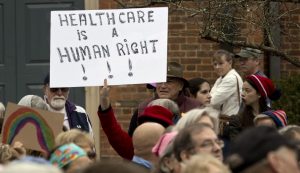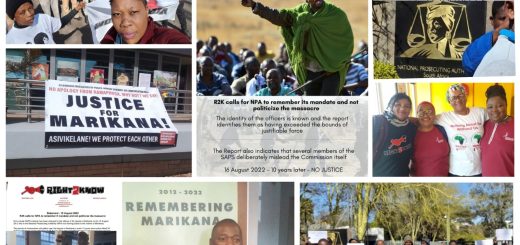R2K Human Rights Day Statement: Protecting our Human Rights against infection by COVID-19!

Photo via Flickr user C Watts
Today we commemorate Human Rights Day with a huge dark cloud hanging over our heads. The dreaded Coronavirus Disease 2019 or COVID-19 pandemic which has infected more than 210, 000 people globally and has already killed more than 8700 people, has also touched us with over 200 confirmed infections over the past 2 weeks. While the South African government has responded swiftly in trying to prevent the spread of the virus including declaring a national state of disaster in terms of the Disaster Management Act in recognition of its magnitude and seriousness, we still live in fear due to the number of deaths that have been recorded in other countries across the globe, and the official projections that up to 60% of the population could be infected eventually to some degree.
As of Friday, 20 March 2020, 202 positive cases were identified in South Africa with zero deaths reported. President Cyril Ramaphosa has announced stringent measures such as shutting down some of our borders, banning travel to high risk countries and prohibiting gathering of more than 100 people. This means our activism will be very restricted, especially protests and public gatherings.
What do regulations issued relating to COVID-19 virus mean for the right to protest?
All gatherings of more than 100 people have been prohibited in terms of the regulations published earlier this week. That has had an impact on all social gatherings, including religious services and sporting events. It also serves as an additional obstacle for legitimate political protest action. In seeking to minimise infection, the government has chosen to place some restrictions on other civil and political rights – including freedom of movement and on the right to protest. We must never forget the lives that were lost on this day in 1960 for the right to give expression to political demands. We should therefore be careful when restricting those hard-won rights in the Constitution. The legitimate demands of communities like the one in Khayelitsha a few days ago, gathering to protest the shutting down of their communal taps by the City of Cape Town, remain legitimate – despite the danger of the coronavirus. Or like the right to take part in political activity by refugees and asylum seekers, which was yanked from them with the passing of the Refugee Laws Amendment Act in January.
The freedom of peaceful assembly and of association in the digital age remains one of the key ways for citizens to maintain participation in our democracy. We therefore would like to assert that during this challenging period, the suspension of certain liberties should not amount to halted active citizen’s participation in the political life of the country. The right to protest is a fundamental right, hard-won; the presence of the health threat by the coronavirus challenges us to continue to speak truth to power – and in more creative ways.
The digital age has opened new space for the enjoyment of the rights to freedom of peaceful assembly and of association. There are numerous examples across the globe which demonstrate the power of digital technology in the hands of people looking to come together to advance democracy, peace and development. However, the digital revolution has also brought a range of new risks and threats to these fundamental rights.
Covid-19 watch what you spread!
With the rapid spread of the novel coronavirus, there has also been the rapid spread of fake news, misinformation and disinformation. Born out of our collective ignorance about the origin, causes and cure for the disease, the false information has fueled xenophobia (especially against Chinese and other Asian people), panic and fear. It has also led to the deaths of pets, the promotion of unscientific “remedies”, and in one case in rural Kenya earlier this week, to an alleged killing of a person who showed signs of COVID-19 infection! Ignorance can be deadly. For this reason we call on our government to ensure the free flow of proper information on a regular basis – not only of the rising infection rates, the isolation areas and the inevitable casualties, but also of the positive steps our government is taking to contain the spread of the pandemic: where people can be tested, disinfection operations and encouraging community-based responses.
Instead of the clampdown and centralisation of information flow, our government ought to be encouraging greater debate and dissemination of information in the media, especially the community media about the disease, protective measures against it, and the impact that the disease will have on our social and economic activity.
Our government has passed regulations that prohibit creating or spreading false information about the virus, about infections stemming from the virus or about efforts to deal with the virus.
Even passing on such false information, on any platform, could result in a hefty fine or imprisonment for up to 6 months, or both. In the same way we are asked to sanitise our hands regularly during the day, we are also asked to fact-check any information we share about COVID-19 on any platform. Whilst freedom of expression is important and integral to our constitution, we must be responsible with our right through this time.
These provisions are reminiscent of those contained in the Hate Speech Bill and present an example of the kind of restrictions on the freedom of expression we are being asked to sanction in this brave, new world. These regulations are meant to be temporary, for the duration of the declaration of the National Disaster; all indications are that the virus will be with us for a long time. Are we willing to sacrifice another fundamental human right due to fear?
The answer lies, at least partially, in us all becoming more active citizens. While it is important to continue to hold the government accountable for their responsibilities in the time of a health crisis, the nature of this crisis requires behavioural change from all of us. Over the past few weeks, we have been asked to practice “social distancing” among ourselves – limiting contact with others and thereby limiting the opportunity and spread of infection – improving our personal hygiene and acting preemptively at the first sign of illness. But while “social distancing” means physically distancing oneself from others, it must go hand-in-hand with social solidarity. This requires us to take care to protect those most vulnerable from the disease. These include the elderly, the very young, and those with already compromised immune systems (such as people living with HIV or TB). That requires a greater community response. We need to come together – even if that is not physically – to give expression to our common humanity by caring for the marginalised and the vulnerable. That is the true spirit of the community action that underpinned Sharpeville and Langa 60 years ago.
R2K urges fellow South Africans to heed all the government guidelines and be extra cautious by avoiding crowded places if you are to attend any commemorative activities today. Contact the COVID-19 Public Hotline: 0800 029 999 or visit https://sacoronavirus.co.za for more information.
Ongazi Makazi!
We have a Right2Protest!
Human Rights Day!
For more information contact:
Ghalib Galant, R2K Deputy National Coordinator: 084 959 1912
Thami Nkosi, R2K Countering Repression Organiser: 062 624 5992
Lazola Kati, R2K Communications Rights Organiser: 072 956 7753
Busi Mtabane, R2K National Communicator: 083 329 7844



